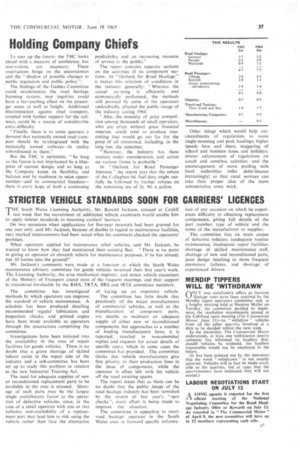STRICTER VEHICLE STANDARDS SOON FOR CARRIERS' LICENCES
Page 39

If you've noticed an error in this article please click here to report it so we can fix it.
THE South Wales Licensing Authority, Mr, Ronald Jackson, stressed at Cardiff last -week that the recruitment of additional vehicle examiners would enable him to apply stricter standards in renewing carriers' licences.
On two occasions when applications for five-year renewals had been granted for one year only, said Mr. Jackson, because of doubts in regard to maintenance facilities, very marked improvements had been noted when his examiners checked the operators' premises.
When operators applied for maintenance relief vehicles. said Mr. Jackson, he wanted to know how they had maintained their existing fleet. "There is no point in giving an operator an eleventh vehicle for maintenance purposes, if he has already run 10 lorries into the ground!"
Mr. Jackson's comments were made at a function at which the South Wales maintenance advisory committee for goods vehicles reviewed their first year's work. The Licensing Authority, the area mechanical engineer, and senior vehicle examiners of the Ministry of Transport attend most of the trequent meetings. and their support is considered invaluable by the RHA, TRTA, BRS and 1RTE committee members.
The committee has investigated methods by which operators can improve the standard of vehicle maintenance. A schedule has been produced detailing recommended regular lubrication and inspection checks, and printed copies have been made available to operators through the associations comprising the corn mi nee.
Investigations have been initiated into the availability in the area of repair• facilities for goods vehicles. There is no doubt that a grave shortage of skilled labour exists in the repair side of the industry and a sub-committee has been set up to study this problem in relation to the new Industrial Training Act.
The need for adequate supplies of new or reconditioned replacement parts to be available in the area is stressed, Shortage of such parts may be the largest single contributory factor to the operation of defective vehicles, since, in the case of a small operator with one or two vehicles, non-availability of a replacement part may lead him to risk using the vehicle rather than face the alternative of laying up an expensive vehicle.
The committee has little doubt that practically all the major manufacturers of commercial vehicles, as well as the manufacturers of component parts, are unable to maintain' an adequate supply of either new or reconditioned components, but approaches to a number of leading manufacturers have, it is reported, resulted ia noncommittal replies and requests for actual details of specific cases, which in some cases the committee has provided. The committee thinks that vehicle manufacturers give first priority to their production lines in the issue of components. while the operator is often left with his vehicle off the road awaiting spares.
The report states that as there can be no doubt that the public image of the road haulage industry has been tarnished by the results of last year's "spot checks", every effort is being made to improve the situation.
The committee is appealing to every road haulage operator in the South Wales area to forward specific informa
tion of any occasion on which he experiences difficulty in obtaining replacement components, giving full details of the part number, type of vehicle and the name of the manufacturer or supplier.
The committee lists six main causes of defective vehicles: inadequate routine maintenance, inadequate repair facilities. shortage of skilled maintenance staff, shortage of new and reconditioned parts, poor design resulting in more frequent premature failures, and shortage of experienced drivers.




































































































































